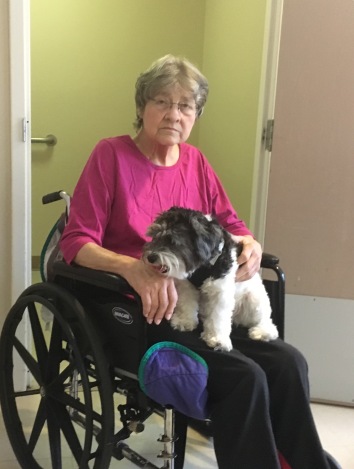 You’re struggling to hold down a job and take care of your mother with dementia. You need help! Do you hire caregivers on your own, or sign up with a home care agency?
You’re struggling to hold down a job and take care of your mother with dementia. You need help! Do you hire caregivers on your own, or sign up with a home care agency?
Before you decide, you need to take stock of your resources. How much money is available? How much time and patience do you have to manage the process?
Here are a few things to consider while you make the decision:
Benefits of hiring caregivers on your own:
- You get to choose them. You can sift through as many applications and interview as many people as you wish, until you find the right fit – for both you and your loved one.
- Your house, your rules. Agencies have rules about what their employees can and can’t do. Need the aide to take out the dog? Drive Mom to the doctor? Give Dad his insulin shot? Some agencies prohibit such tasks.
- You can communicate directly with your caregivers. Many agencies don’t let their employees have the client’s telephone number. This is horribly inconvenient, but designed to keep aides from working “off the books” for a client.
- Not working out? No problem! If something goes awry, there is no middle man to get in the way. You can simply fire them on the spot (this could also be a con).
- You set the schedule. Agencies often assign their employees to more than one job in a day. If their relief didn’t show up at the house before yours, or they run into traffic, you could be faced with skipping your own doctor’s appointment or leaving Mom alone. You can also offer things like their birthday (or their kids’ or significant other’s birthdays) off – little perks that make working for you a little bit better.
- You set the pay rate. Agencies need to make money and pay their overhead; therefore, they pay their employees less than they would make at a private duty job. Caregiving is hard – you know, that’s why you need help – and those aides who are paid fairly tend to do a better job. I also paid overtime on days that aren’t considered bona fide holidays by most agencies – Christmas Eve, Mother’s Day, Valentine’s Day, etc. Nobody wants to have to work on a day that is special to them.
- It’s cheaper. Agencies charge upward of $18 an hour, while paying their employees a fraction of that. I know one client who paid their agency $21 an hour, while the agency paid the personal care aide $9 an hour. I’ve hired aides who made minimum wage ($7.25 an hour in Virginia) at an agency. No wonder aides quit to work retail or in the fast food industry – if you’re going to be making minimum wage, flipping burgers is a lot easier than wiping butts.
- Employees are plentiful. Many agencies are understaffed and can’t meet the demand for their services. There can be a waiting list of days to weeks – which makes it difficult if you need to go back to work right now. Place an ad on care.com or another platform offering a decent wage, and you will be inundated with potential employees.
- You do your own background check. Sure, agencies conduct the standard background check offered through a service or a local police agency. Depending upon state laws, they might hire an employee prior to doing the check, then dismiss them later if something disturbing appears. In addition to the traditional check that you can conduct for a small fee (usually $30-$50), you can delve deeper into the employee’s background. Sure, they list references, but you can talk to others at their previous places of employment. You might call a former instructor. Stalk their social media accounts. Agencies don’t go to that much effort, but you will. After all, these folks will be practically living in your house.
- Bonuses. Most reputable agencies prohibit their employees from accepting bonuses or gifts from clients. But as an employer, bonuses are a valuable way to keep up morale. I gave bonuses on the employees’ birthdays, as well as at Christmas. I gave Mom’s day aide – who had the brunt of the mess (and smell!) when Mom had c. diff – a special “poop bonus.” Appreciation works.
While hiring your own caregivers could be more economical and better for your family, there are some serious reasons why you shouldn’t take it on. Here are some of the cons of hiring your own caregivers:
- Payroll. While there are numerous programs and apps to make it easier, you still have to do it. Track hours, write checks or send money transfers, and the worst of all – pay taxes. Yes, you should do this. While it’s easy to pay someone “under the table,” it’s also illegal. And it deprives them of paying into essential programs like Social Security and Medicare. They will thank you one day. Really. Agencies take care of all of the bookkeeping and paperwork.
- Red tape. This is related to payroll. If you hire someone to work in your home (or your loved one’s home) and pay them more than $2,000 a year, you are considered a “household employer” by the IRS and state tax departments. You must obtain a Federal Employer Identification Number from the IRS. It’s a fairly simple, online process. Different states have different rules for withholding and paying taxes as well as signing up for the state’s unemployment insurance program. Also, the state and feds might have different schedules. For example, household employers can pay their withholding and “nanny taxes” when they file their personal tax return. Some states require quarterly reports, and there is a penalty if you don’t get them in on time. I know – yours truly paid a hefty sum to the Commonwealth of Virginia for procrastination. Agencies eliminate the need to declare yourself an employer.
- No backup. Someone is sick, or their babysitter doesn’t show up, and they can’t come to work. You have to scramble to get someone to cover. Agencies often (but not always) have someone else they can send to fill in for the absent employee. They also are more likely to have someone who can stay overnight if you travel for work or pleasure.
- You’re the boss. With the control of doing your own hiring and firing, you get the responsibility of doing the hiring and firing. You can’t blame something on the big bad boss at the agency – you have to discipline the workers, and even fire them, if necessary. Not fun. Agencies take on the Big Bad Boss role for you.
- Medicaid. If your loved one runs out of money and needs to sign up for Medicaid, the state-federal health care program for low-income people, already being signed up with an agency that participates with your state’s program will help immensely. Even if you opt for “consumer-directed” Medicaid services at home (where you hire your own aides), you still need an agency to accept the Medicaid payments and pay the caregivers. The program won’t pay families or pay your caregivers directly – you have to have a “Medicaid facilitator.”
- Insurance. If your loved one has long-term care insurance, using an agency will make the process much easier. Depending upon the terms of the policy, you might not be able to hire people on your own. Providing the documentation and paperwork will fall to the agency, which is a load off of your shoulders. Also, if your loved one needs equipment such as a wheelchair or hospital bed, agencies have contacts and expertise to make this happen without adding to your task list.
- Liability. Your Mom’s aide hurts her back lifting your Mom off the toilet. That’s a worker’s compensation issue. An agency is covered. Are you? If the employee abuses your loved one or steals from you, the agency has procedures as well as insurance to cover it.
- Licensing. Licensing issues for Certified Nurse Aides or other professionals are murky when it comes to household employment. This is both good and bad. For example a CNA for an agency or facility can’t give medications or injections, even if they know how. There isn’t that oversight in your home, which can make life easier for you. However, if they do something like abuse their patient, do drugs, or otherwise break the rules of their profession, you would want to deal with that with the state licensing authority. Having an agency with a pipeline to the licensing organization makes that easier.
- Contracts. You really should have contracts with each of your employees if you are hiring yourself. If you use an agency, your contract is with the business to provide the services. They take care of their own employee contracts. Less work for you.
- Bridging distance. If you don’t live near your loved one who needs help, it can be very difficult to recruit and manage caregivers from afar. With an agency, you have a level of supervision and management.
Regardless whether you use an agency or hire caregivers on your own, research is essential. Make sure you do your homework before you dive in. If you are considering hiring your own caregivers, the IRS has a handy guide for household employers. You can compare home health agencies on Medicare’s website.
Ginger Thompson has been a family caregiver since 2015.


 It was 1:44 a.m. on a Thursday morning when the electronic box by my bed started blaring a very loud tune that was way too cheerful for the hour. It meant Mom had pushed her “call button,” a wireless device I had purchased so that she could summon me when she needed help.
It was 1:44 a.m. on a Thursday morning when the electronic box by my bed started blaring a very loud tune that was way too cheerful for the hour. It meant Mom had pushed her “call button,” a wireless device I had purchased so that she could summon me when she needed help.


 I’ve started seeing a witch doctor.
I’ve started seeing a witch doctor.
